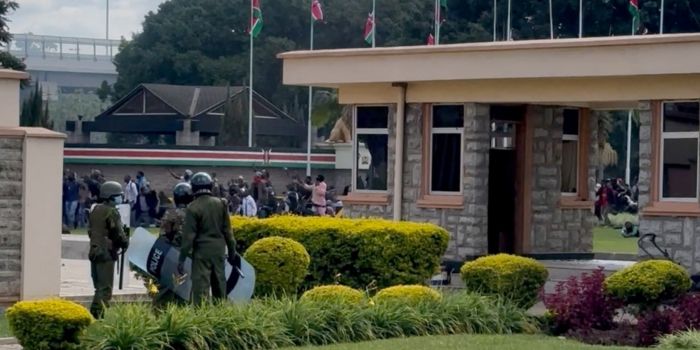Flood risk alert: Health ministry issues key directives for schools

By Amina Wako |
Floodwaters can heighten the transmission of various water-borne and vector-borne diseases such as typhoid fever, cholera, malaria, yellow fever, chikungunya, and dengue fever.
The Ministry of Health has issued a critical advisory addressing the potential health risks in schools following heavy rains pounding the country.
Principal Secretary Mary Muthoni, in a statement on Saturday, called upon school administrators, management boards, and other relevant offices to take immediate action to safeguard the health and safety of students.
Keep reading
PS Muthoni highlighted the significant impact floods have on both the quality of education and the health of students, emphasising that these effects are often underestimated.
Floodwaters can heighten the transmission of various water-borne and vector-borne diseases such as typhoid fever, cholera, malaria, yellow fever, chikungunya, and dengue fever. PS Muthoni urged school management to identify possible risk factors within their environments and implement appropriate remedial measures.
"This has a negative impact on schools because they come into contact with contaminated water, which increases the prevalence of water-related diseases and sometimes leads to outbreaks of infectious diseases within school communities," the statement read.
"Since floods can potentially increase the transmission of water-borne and vector-borne diseases, such as typhoid fever, cholera, malaria, yellow fever, chikungunya, and dengue fever, among others, it is important that school management know the possible risk factors within their school settings and appropriate remedial measures," she added.
Key recommendations for schools:
1. Water Safety: Treat all water with chlorine or boil it before using it for drinking, cooking, bathing, brushing teeth, and washing utensils.
2. Hygiene Practices: Encourage good hygiene habits and safe food preparation techniques. After coming into contact with floodwater, students should wash their hands with soap and water.
3. Avoid Floodwater: Children should not swim or walk through flooded areas or standing water due to the risks of electrocution and disease.
4. Clothing and Bed Nets: Children in mosquito-prone areas should wear trousers and long-sleeved shirts and use mosquito nets.
5. Facility Maintenance: Ensure all toilets and bathrooms are in good condition. Close, mark, and provide alternative facilities for toilets affected by floods.
6. Environmental Control: Cut overgrown grass to reduce breeding grounds for mosquitoes, rodents, and snakes. Ensure windows and doors are functional to protect against adverse weather.
7. Food safety: Store food properly to keep it away from moisture and rodents. Medical examinations and vaccinations are mandatory for cooks.
8. Health Vigilance: School administrators should be alert to any abnormal disease occurrences and notify the nearest health facility as soon as possible.
𝐏𝐫𝐨𝐭𝐞𝐜𝐭𝐢𝐧𝐠 𝐏𝐮𝐛𝐥𝐢𝐜 𝐇𝐞𝐚𝐥𝐭𝐡 𝐢𝐧 𝐒𝐜𝐡𝐨𝐨𝐥𝐬 𝐃𝐮𝐫𝐢𝐧𝐠 𝐇𝐞𝐚𝐯𝐲 𝐑𝐚𝐢𝐧𝐬/𝐅𝐥𝐨𝐨𝐝𝐬
— Ministry of Health (@MOH_Kenya) May 18, 2024
The Ministry of Health is advising all school administrators, management boards, and concerned offices to take urgent measures to protect the health and safety of… pic.twitter.com/40Wefb8QZh
PS Muthoni also called on the Department of Public Health to support school administrations by regularly inspecting sanitation conditions and conducting water quality tests.
"Regularly carry out water quality testing for both free chlorine residue and E. coli. Assist in disinfecting where the water does not meet the acceptable standard," she said.
The PS further urged the Department of Public Health to promptly respond to any notification from schools about health conditions among school communities.
"We are once again requesting your cooperation and partnership during these trying moments of heavy rains and floods. As our children go back to school, we should all ensure their safety and an enjoyable learning environment. We are looking forward to your vigilance and appropriate action," the PS said.



















